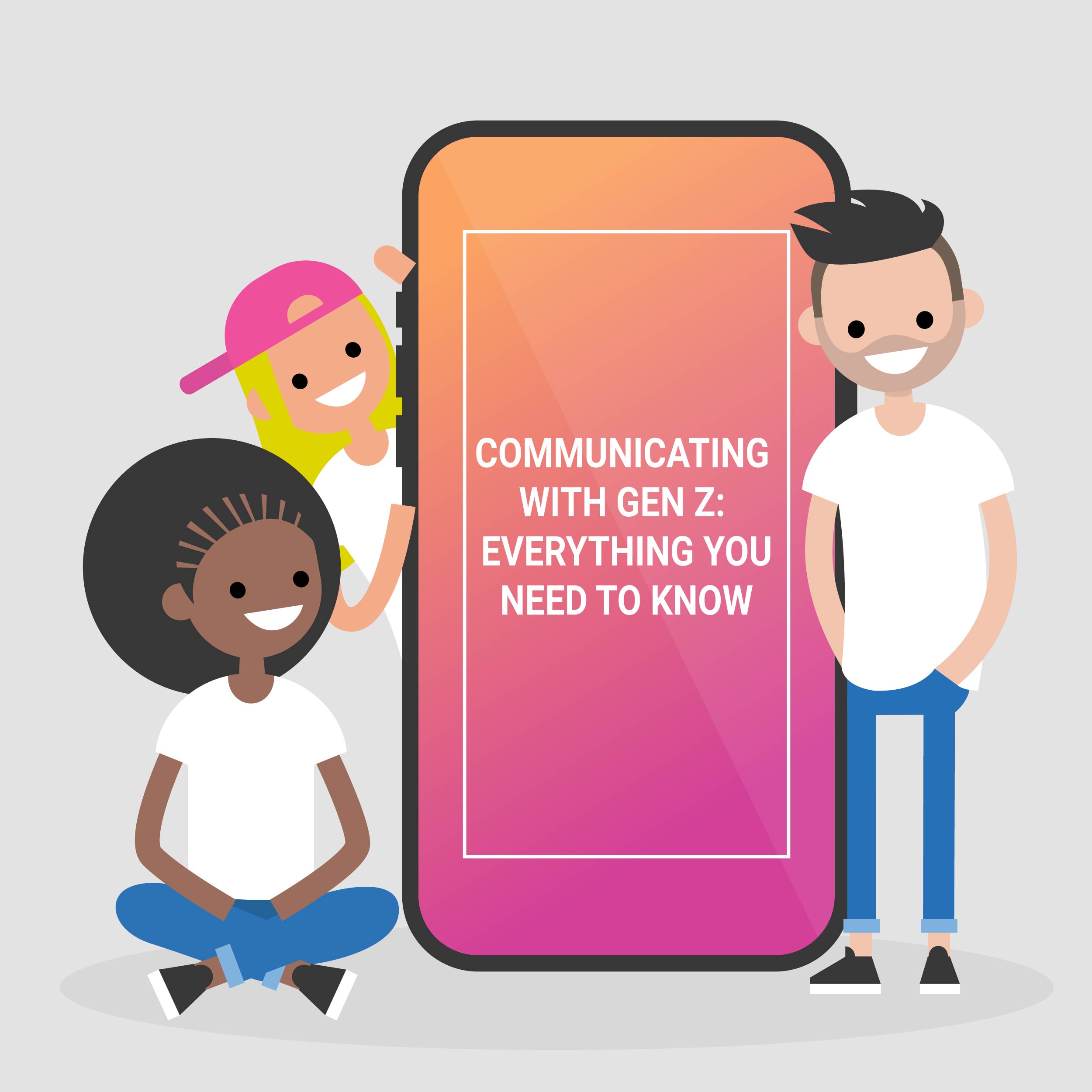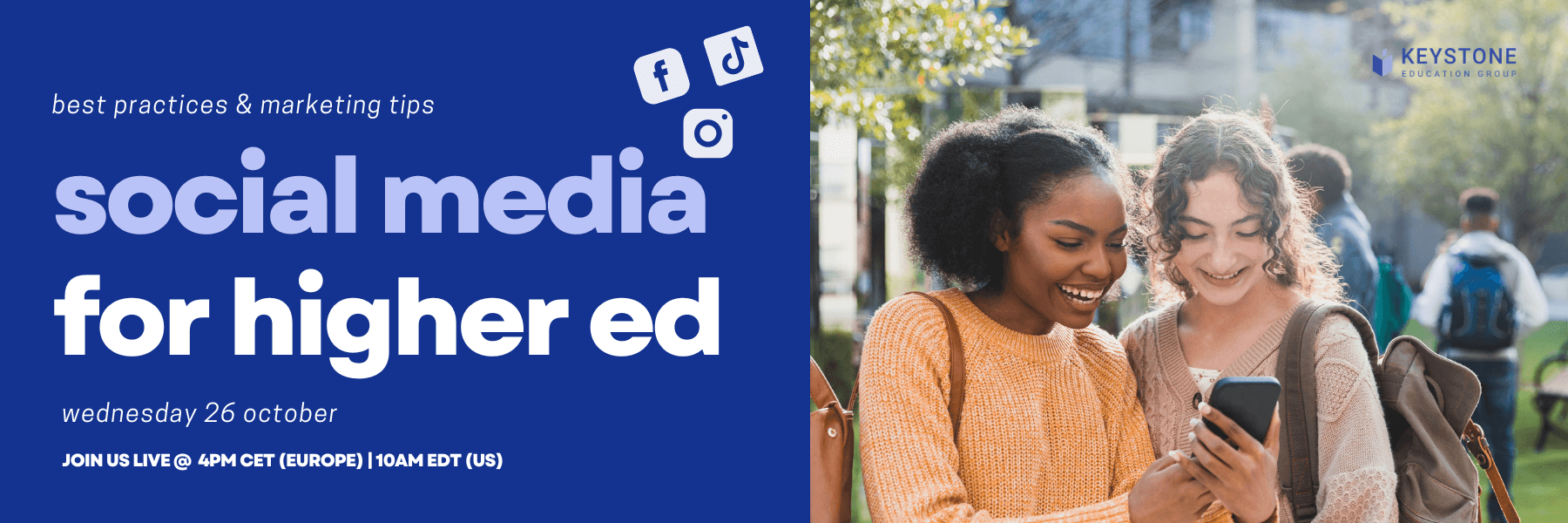- SERVICES
- HIGHER EDUCATION MARKETING
- ENGAGEMENT & ENROLLMENT MANAGEMENT
- STUDENT RECRUITMENT AGENCIES
- PROFESSIONAL EDUCATION & TRAINING
- WHO WE ARE
WHO WE ARE
Learn more about Keystone Education Group, including our leadership structure, why choose Keystone as your educational partner, and company press releases.
QUICK LINKS
- RESOURCES
RESOURCES
Find a range of helpful resources to help with your educational marketing. From on-demand webinars, reports & data, to customer testimonials and our downloadable media kit.
QUICK LINKS
- NEWS
- REQUEST A CALL

- Keystone Higher Education News
- Communicating with Generation Z: Everything You Need to Know
Colleges have been marketing to millennials, 'the most researched generation', but understanding the next generation is critical to student enrolment success.
Generation Z shares some qualities with their predecessors, but they are also unique and distinctive in their own wants and needs - especially when it comes to communication.
Here is a closer look at what admission offices and marketers should know about communicating with Gen Z.
Who is Generation Z?
The term “Generation Z” refers to the group of people born between 1995 and 2012. They’re currently between the ages of 10 and 27, and they’re already at a college campus near you.
We recently took a look at five things international college recruiters should know about Gen Z, including what they’re interested in studying, how they’re studying, their degree goals, they’re concerns about higher ed, and how they prefer to communicate. While understanding all these aspects is important, the value of deploying the right communication strategies cannot be overstated.
How Generation Z Communicates
Perhaps one word rises about the din when it comes to reaching this generation. Instant. As the first generation of digital natives, they’re not only used to the availability of information, but also to the immediacy of information.
18-year-old college student Hannah Payne put it best in telling the New York Times, “I can simultaneously create a document, edit it, post a photo on Instagram and talk on the phone, all from the user-friendly interface of my iPhone….Generation Z takes in information instantaneously, and loses interest just as fast.”
According to branding agency managing partner Dan Schawbel, communication with GenZ needs to be concise and visual. “We tell our advertising partners that if they don’t communicate in five words and a big picture, they will not reach this generation.”
If you think they sound a lot like Millennials, you’re right -- to a degree. Explains digital product and UX design agency Ideas in Digital, “One of the most striking differences between the two generations would have to be their choice and method of communication. Gen Z communicates with images and they multitask across multiple screens as opposed to Millennials preferring to communicate on two screens and via text. Gen Z’s attention spans are getting shorter as well, explaining their preference for video and images rather than text. They are the ultimate consumers of snack media. They communicate in bite sizes. Punchy headlines or razor sharp text resonate much better than lengthy chunks of words or long-winded passages.”

But while multiple channels are important, one communication mode rises above the rest: texting over talking. In a LivePerson survey investigating the “digital lives of Millennials and Gen Z,” nearly 75 percent of respondents told researchers that they’re rather text than talk on the phone. Concludes LivePerson global head of communications and research Rurik Bradbury of the findings, “What we see in the research data is the phone truly becoming an extension of the self, and the platforms and apps within it -- digital life -- occupying more than their offline interactions.”
But don’t assume that digital means impersonal. Across all channels, personalization is the key to cutting through the noise and catching the attention of Gen Z. Not only that, but while the majority may prefer texting, plenty of them -- 39 percent, according to data from LeadSquared -- say that one-on-one communication is the most effective way to reach them.
Gen Z expert and co-writer of Generation Z Goes to College Corey Seemiller told immersive technology company YouVisit, “I think in a world where we envision Generation Z being digital natives, we also envision them only being digitally competent and only preferring digital methods of communication. But in many communications they still like a personal touch. So, as [admission professionals] think about recruitment, remember that the face-to-face thing is still very important to them–probably, more important than people are giving it credit for.”
The Authenticity Imperative
Gen Z also pushes back against the Millennial tendency to unabashedly live out loud. Rather, they’re all about cultivation and authenticity.
Asserts think tank Irregular Labs in its seminal guide to all things Gen Z, “The Irregular Report,” Gen Z's selfies are in the caption, not the picture — or in the tension between flattering selfie and self-deprecating comment that demonstrates their wit, cultural clout, intelligence and authenticity via confessional."
In other words, it’s not just about showing off a picture, but about a more comprehensive expression of self. Generation Z applies this same mindset when it comes to the marketing that appeals to them: Purpose is a transcending factor.
Influencer Marketing is Everything
Given their preference for authenticity, it makes sense that Gen Z are most impacted by their peers. Writes serial entrepreneur, marketer and bestselling author Deep Patel for Forbes, “Influencer marketing has become extremely popular for targeting younger demographics. Influencers appear more genuine, they carry their own loyal audiences and the content they produce tends to outperform the content most brands create internally.”
And there are plenty of opportunities for higher education to leverage the power of influencer marketing. “Universities can leverage influencer marketing by finding their potential influencers – such as successful graduates and well-connected students – and recruiting them to produce and promote relevant content. There are endless opportunities: you could showcase an attractive location and lifestyle with the president of the paddleboard society livestreaming a practice session. Or you could highlight graduate success with a Q&A video between a journalism student and a successful graduate. You could even get a student influencer to do a 24 hour Instagram takeover to show what a ‘life in the day’ looks like at your campus,” suggests market research consultancy Red Brick Research.
One caveat for universities looking to employ the clout of influencers in their marketing strategies – the connection needs to be both genuine and relatable. As an academic cohort, Gen Z is emerging as a practical, no-frills generation that grew up in an age of austerity and with the omnipresent specter of student debt. Look to engage them with influencers who model pragmatism and initiative.
Understanding Regional Nuances
While Gen Z-ers share many traits amongst themselves, it’s also essential to note that not all members of this group are created equal.
In the US, for example, the multiculturalism of Gen Z requires consideration. It’s the US’s largest generation to date – already accounting for 26 percent of the population. But more important is the make-up of that percentage. According to research cited by PR Weekly, in the US only 53 percent of Gen Z identifies as non-Hispanic white (down from an estimated 56 percent of Millennials), making it the country’s most diverse generation yet. And because they are so diverse, it follows that the also prize diversity in their surroundings. Offers Glassdoor, “[Gen Z is] the most diverse and multicultural of any generation. They’ll surely value a workforce that represents their world.”
Gen Z’s diversity also means that US schools, and international campuses that want to attract US students, need to be prepared to welcome and support an influx of first-generation students who may have less experience with the norms of higher education than the rest of their cohort. Support is a crucial communication method for Gen Z in general. Research shows that America’s Gen Z is arriving on campus with less life experience than their Millennial siblings and GenX parents, and institutions can capitalize on this by highlighting campus services that offer support and guidance.
While support and service are paramount everywhere, it’s more so in places like China, where “Z-lennials,” AKA those born just before or during this millennium, are increasingly influential. Attracting Chinese students has always required a special touch, and China’s Gen Z will continue to demand a targeted approach.
Mike Vinkenborg of China-focused consulting firm Daxue Consulting told Reach Further, “Western companies come and go in China...One of the main issues for those that don't succeed is that they don't localize their business strategy. You have to understand the local market to engage, especially when it comes to Generation Z, because these guys frequently have little brand loyalty...The ongoing drive for individuality, self-expression and authenticity means Chinese Z-lennial consumers are becoming more and more discerning.”
In Africa, where digitization is still on-going, Gen Z shares more similarities with Millennials than in other parts of the world. Still, approximately 20 percent of Africa’s population is under the age of 24 and African youth are twice as connected as the general population. According to Liquid Telecom’s African Generation Z Report 2018 some marketers have begun to identify a pan-African generation that spans the Millennial and Gen Z cohorts. These ‘Afrillennials’ are innovative and entrepreneurial, and many economists are looking at them to disrupt and develop the Africa of the future. One area where Africa is taking the lead – gaming and eSports. According to Liquid Telecom, gaming revenues are significant in Egypt, Nigeria, South Africa, Kenya, and Morocco and local developers are becoming important innovation drivers in countries like Ghana and Zambia. Promoting digital fields of study – especially those that are offered online or in short-course format – will connect schools and programs with Africa’s confident and adaptable innovators, many of whom are looking to learn as they lead.
All of which begs the question: If they’re so diverse, what is the best way for colleges and universities to reach Gen Z?
Use Social Media Like Generation Z
On Instagram, Gen Z showcase their aspirational selves; on Snapchat, they share real-life moments; on Twitter, they get the news; and on Facebook, they glean information. So while they’re absolutely reachable via social media, optimally connecting with them relies on reaching them the right way.
Of course, marketing higher education to Generation Z requires nuances beyond those employed by companies selling sneakers or coffee; but some of the same principals apply. AdWeekly notes that marketing messages aimed at Gen Z “need to be clear about what they stand for so that their brands are not interpreted as uninvolved in or opposed to social causes important to Gen-Z-ers.’ Gen Z is uniquely principled. Research in the US shows that they value diversity and tolerance, but question the right to free speech when it is used against things – or individuals – Gen Z support. This doesn’t mean that colleges and universities need to become universal ‘safe spaces.’ Rather, universities can use marketing and social media to communicate integrity and articulate values in ways that allow potential applicants to align themselves with the institutions in a meaningful, informed context.
The takeaway? It’s not just about using social media and other marketing channels to communicate. Instead, think about social and other medias as extensions of your institution’s identity.
But Don’t Forget Their Parents
One last thing to keep in mind about communicating with Generation Z compared to with Millennials? When we talk about them as products of their environment, we’re not just talking about their status as digital natives. We’re also talking about their Generation X parents, who prize practicality and self-reliance above all else -- and who remain very much part of the decision-making process.
Despite economic recovery, the legacy of the recession means a lot of higher education infrastructure meant to attract and retain highly demanding millennial students will no longer hold the same appeal. Gen Z and their Gen X parents are far less focused on the bells and whistles of campus life and more concerned with the practical and tangible benefits of higher education. Concentrate your marketing and communication on academic excellence and post-graduate success.
Can You Reach Them All?
The simple answer is: No. But the real question is, can you reach the right students? The key to marketing to and communicating with Generation Z is specialized, personal communication that acknowledges the individual. Gen Z may be the most digitally-native, connected generation yet but that means that they value personalized approaches all the more.
Start by positioning your marketing strategies as an extension of your institution’s identity. Embrace the Gen Z quest for authenticity and identify your value-added characteristics and unique offerings. What makes your university different? Who will thrive in and enhance your student body? How is your campus a community, and what does that community stand for?
The most important takeaway is this new generation is only now emerging into the world of higher education. Make sure that your strategies are agile, customizable, and ready for the momentum of Generation Z.
WATCH ON DEMAND WEBINAR:
More about:
Related Tags
Just For You
Top Picks
Higher Ed Chats Podcast
Listen to the latest episodes of our Higher Ed Chats Podcast - new format for 2024. Hear from Higher Ed thought-leaders from around the world!
Who Will Win The Keystone Awards?

Watch the Keystone Awards Ceremony to see the winners of the 2025 Keystone Awards!
Subscribe
to get the latest news and updates






